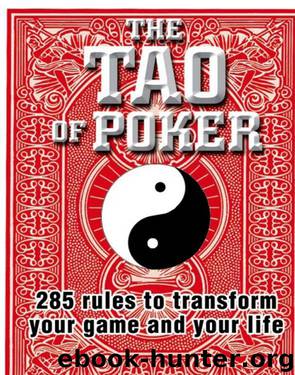The Tao Of Poker by Larry W. Phillips

Author:Larry W. Phillips
Language: eng
Format: epub
Tags: ebook, book
Publisher: Adams Media
Published: 2003-07-15T00:00:00+00:00
Chapter 13
On Steaming, Calm,
and Composure
“He submits to be seen through a microscope, who suffers himself to be caught in a fit of passion.”
—Johann Kaspar Lavater
“No one can achieve serenity until the glare of passion is past the meridian.”
—Cyril Connolly
Rule 169: Try to keep emotions out of the game.
One important poker objective is to try to stay as neutral as possible— and not to get emotionally caught up in the game. The reason is because it is much harder to get a clear sense of what is going on in the game once heated emotions come into play. A certain measure of indifference is therefore helpful. Another way of putting it would be: Stop caring so much. Caring—deeply and passionately—tends to wedge itself between us and our play. It interferes with clear perception and objective analysis (not to mention making us more readable).
Eliminating emotions from the game also has the side benefit of eliminating very negative emotions, such as the joys of payback, the pleasures of one-upping someone, the thrills of revenge, anger, hostility, and so on. These bad-karma emotions are also among those done away with under a program of abolishing all emotions.
Finally, if you show emotion during poker (“I’m angry! I’m not getting any cards!”), opponents only need to look for a continuation of those emotions (or lack thereof) to read your play.
“To play at the top of your form, you cannot be emotionally involved in the results.”
—Arnold Snyder, Card Player magazine
Rule 170: The importance of emotional management in poker.
“Money management” is a term frequently mentioned in the poker literature, but emotional management is equally important. Extra focus on composure is necessary to offset the extra measures of anger that are contained in some of these games. Frustration is such an intrinsic part of some of them (Omaha/8, for instance), that we should probably sit down in the game with this subject in the forefront of our minds. Our emotions need to be thought of as a separate project, not as some kind of side issue or something peripheral.
There is a lot of anger in poker. The usual reason is because of the luck factor (draw-outs, bad beats) and also because the markers used in the game (the game pieces) are money—other people’s money—and that makes it personal. Emotional management therefore needs to be kept in the forefront of our focus and not be put on the back burner.
Rule 171: If you go on tilt, it may be better if you lose.
It sets a bad precedent for future play if you go on tilt when something bad happens in the game, and you win by this means. It reinforces this as a possible approach to take on future occasions. In the back of your mind will always be the memory of how you dug yourself out of a big hole one other time by betting wildly and irresponsibly, so you may be tempted to try it again. When such “tilt hands” win, it can be difficult to put the old standards back in place.
Download
This site does not store any files on its server. We only index and link to content provided by other sites. Please contact the content providers to delete copyright contents if any and email us, we'll remove relevant links or contents immediately.
Harry Potter and the Cursed Child: The Journey by Harry Potter Theatrical Productions(3965)
The Sports Rules Book by Human Kinetics(3588)
Molly's Game: From Hollywood's Elite to Wall Street's Billionaire Boys Club, My High-Stakes Adventure in the World of Underground Poker by Molly Bloom(2968)
A Knight of the Seven Kingdoms by George R R Martin(2623)
Quidditch Through the Ages by J.K. Rowling(2577)
Quidditch Through the Ages by J K Rowling & Kennilworthy Whisp(2565)
How To by Randall Munroe(2476)
Quidditch Through the Ages by Kennilworthy Whisp by J.K. Rowling(2413)
Quidditch through the Ages by J. K. Rowling(2359)
Quidditch Through The Ages by J. K. Rowling(2322)
Stacked Decks by The Rotenberg Collection(2270)
776 Stupidest Things Ever Said by Ross Petras(2267)
The Infinite Retina by Robert Scoble Irena Cronin(2179)
What If?: Serious Scientific Answers to Absurd Hypothetical Questions by Randall Munroe(2170)
Flowers For Algernon by Daniel Keyes(2159)
Beautiful Oblivion by Jamie McGuire(2144)
The Book of Questions: Revised and Updated by Gregory Stock Ph.d(2139)
Champions of Illusion by Susana Martinez-Conde & Stephen Macknik(2077)
Ready Player One: A Novel by Ernest Cline(2075)
